Managing Everyday Stress
In these modern times, stress is an inescapable part of the landscape. It’s a worldwide epidemic affecting people of all ages, genders, and socio-economic backgrounds. Whether you’re a small business owner, a college student, or a stay-at-home mom, stressors are virtually inevitable—coming in from every direction.

Feeling emotionally or physically tense can leave you frustrated, anxious, nervous, and even lead to serious mental health issues such as depression. Physically, stress can result in high blood pressure, obesity, heart disease, and diabetes. Managing stress well is a skill that can significantly improve your life, from aiding you in forming better habits to helping you feel more motivated and energized.
In fact, fatigue —the feeling of constant tiredness and weakness—is one of the most prevalent stress symptoms. According to the American Institute of Stress, 51% of adults experience fatigue, 44% experience headaches, and 30% have tension in their muscles because of stress.
During times of crisis or unrest, managing stress can become an even larger part of the conversation. In 2020 in particular, anxiety and distress have taken center stage as our nation (collectively) feels anxious about the COVID-19 pandemic, the elections, natural disasters, and an uncertain economy.
City lockdown orders, online learning, job insecurity and the like, have taken stress to colossal levels threatening mental health nationwide. In fact, the American Psychological Association’s latest report reveals 8 in 10 Americans say the future of our nation is a significant source of stress for them, further emphasizing the importance of learning to manage stress.

Why is Stress Management Important?
Simply put, stress is how your brain and body respond to any demand or challenge. Be it a pop quiz, a life change such as divorce or losing a job, or even simply worrying. But, not all stress is bad. In a dangerous situation, stress signals are all about survival. It’s why your pulse quickens, breathing gets faster, muscles are more tense, and your brain uses more oxygen to increase activity.
The problem is that in a non-threatening, day-to-day life, your body doesn’t need this level of energy and alertness. Doing homework or responding to emails isn’t exactly dangerous. In fact, a joint study between the U.S. and UK from Viber, found 31% of respondents were stressed about texting. Yes, you read that right! Texting!
Clutter, oversharing on social media, and being late are other unnecessary and hard-to-believe stressors. None of these require your body to prepare for an attack. Managing stress well is about knowing the difference between danger and futility.
When you’re stressed out on a regular basis, what’s known as chronic stress, your body functions at this heightened level and is continuously in distress. Without the return to normal functioning, you can have issues in your immune, digestive, cardiovascular, sleep, and reproductive systems which of course, can result in a host of other health problems.
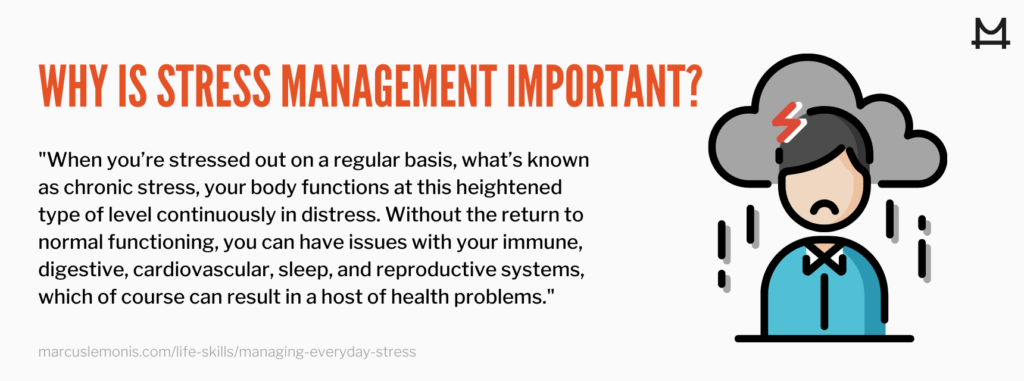
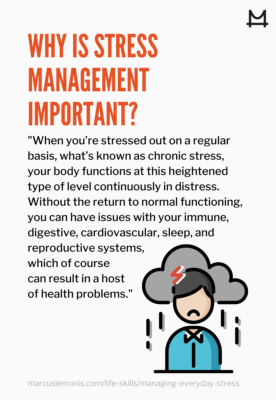
4 Disadvantages of Bad Stress Management
Poor stress management skills can affect your body and mind, from illness to thoughts, feelings, and behaviors. Every individual responds to stress in their own way, which is why an online search on managing stress comes with over one billion results. The type of symptoms, their severity, even frequency is unique to each person.
1. Leading Cause of Death
According to research titled “Life Even, Stress and Illness,” in the National Center for Biotechnology Information, the morbidity and mortality due to stress-related illness is alarming. Emotional stress is a major contributing factor to the six leading causes of death in the U.S.: cancer, coronary heart disease, accidental injuries, respiratory disorders, cirrhosis of the liver and suicide.
2. Effect on Body
Headaches, muscle tension or pain, chest or back pain, constipation, stiff neck or jaw, shortness of breath, fatigue, stomach upsets, and sleep problems
3. Effect on Mood
Anxiety, restlessness, lack of motivation, decreased focus, feeling overwhelmed, irritable, angry, sad, depressed, panic attacks
4. Effect on Behavior
Over eating or under eating, drug or alcohol misuse, tobacco use, not exercising or being less active, insomnia, social withdrawal, missing work, less productivity
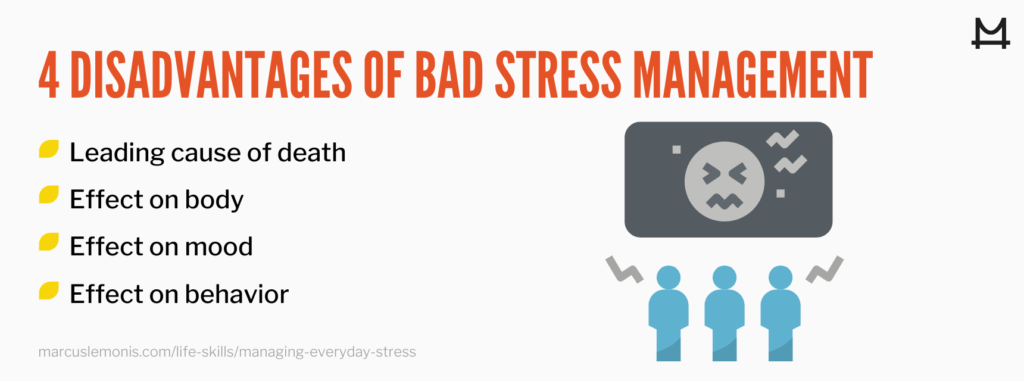
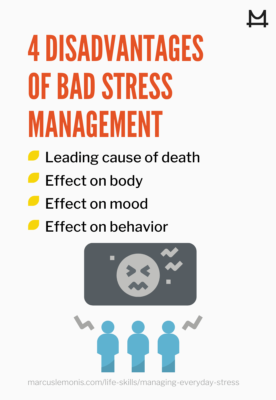
Benefits of Good Stress Management
Managing stress well means more than taking an occasional warm bath or playing video games after work. Although these activities seem to help you relax—according to the Mayo Clinic—these inactive ways of unwinding increase stress over time.
When it comes to managing stress, it’s crucial you try more active ways such as practicing meditation or spending more time with family and friends. That’s how you truly get the benefits of stress management and live a better life.
So what to look forward to? How about more stable moods, better relationships, less conflicts, improved communication skills, stronger immune system and fewer colds, reduced risk of illness, increased concentration, an easier time managing your weight, better sleep, improved hormone balance, and the list goes on and on.
For many, managing stress well means to check-in with themselves as stressors arise. This helps them assess if they’re in fact true stressors. (Remember the texting example above?) They take the time to think about their response: Is their reaction justified? Are they misinterpreting the situation? Is there another opportunity here? Would more details help? With this ability to think more clearly and rationalize before emotions take over, managing stress is easier.
9 Tips to Manage Everyday Stresses
People are anxious for various reasons from conflicts at work to financial worries to dealing with a new addition to the family or even moving to a new city. But work issues seem to take the cake when it comes to stressors. In fact, an Everest College report states 83% of U.S. workers experience significant stress during work hours. And according to the American Psychological Association, roughly $500 billion is lost because of workplace stress.
As mentioned before, managing stress depends on the individual. What works for one may not work for another. Fortunately, there’s plenty of advice on the topic from writing out to-do lists to taking up a new hobby and more. Let’s take a closer look at tips and tricks for managing stress:
1. Mindfulness
Staying in the moment, and in the present as you go about your day is important. Try to bring awareness to your daily activities and routine. Be present when brushing your teeth, doing the dishes, writing out an essay or a financial report. Even 20 minutes a day is enough!

2. Meditation
Meditating is simply guiding your thoughts. You can do so with deep-breathing exercises, walking, swimming, listening to guided visualizations and more. Do what works best for you, and allows you to relax.
3. Exercise
Working out allows your body to release those feel-good endorphins for a natural state of well-being. Exercise relieves pent up energy and tension, all while making you stronger and healthier in the process. Becoming a gym member can also help you meet new people and naturally encourage you to eat more nutritious, more balanced meals. Don’t forget to stretch!
4. Positive Attitude
Accept that there are certain events out of your control, all you can do is remain positive.
5. Communication
Assert yourself instead of being angry or aloof. Share your opinions, beliefs, and thoughts instead of being annoyed, defensive or passive-aggressive.
6. Being More Social
Make sure you stay connected with people and engaged in conversations. Commit to plans, visit old friends, grab lunch with colleagues, spend quality time with family, or volunteer. It’s important to have a sense of belonging, you’re a social being after all.
7. Trying a New Hobby
Whether it’s race car driving, knitting or learning a new language, there must be something you’d like to dabble in. Managing stress can be the catalyst for a new skill. Block out some time to discover and explore new interests as you unwind.
8. Saying “No” More
You can’t be everywhere, all the time. You can’t be everything to everyone. It’s important to prioritize your relationships, and set boundaries with people. Learn to say no to events or requests that can add stress.
9. Reaching Out for Help
If managing stress techniques don’t work for you, don’t hesitate to talk to a healthcare professional. There are many treatment options, from medication to therapy, and more. Consider seeing a counselor or therapist who can help you identify your personal sources of stress and teach you how to cope.
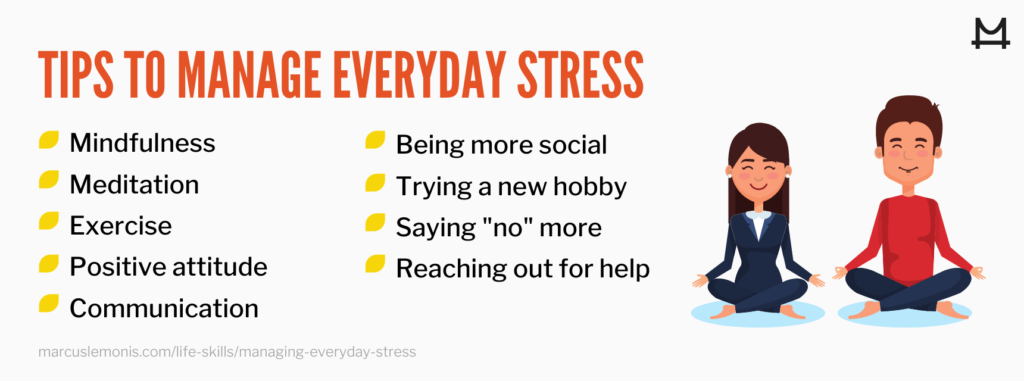
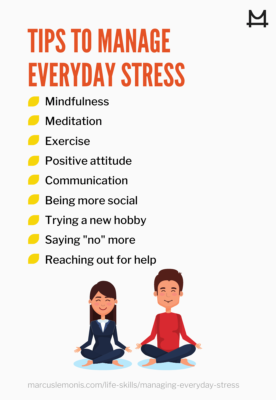
Stress is everywhere today. Just around the corner where your boss is waiting for your reports.Testing your patience as it drives by you during morning rush hour traffic. Ready to strike as you have your hands full with the kids’ school projects, of course. Fortunately, you’re now armed with real-life, tested-and-true tips for managing stress. You know what symptoms to look out for, the consequences of poor stress management, how to cope. So go ahead, and enjoy letting go of the small stuff and make room for more happiness.
- What are some things you do to manage your stress?
- What tips from above do you think will be most helpful for you?





